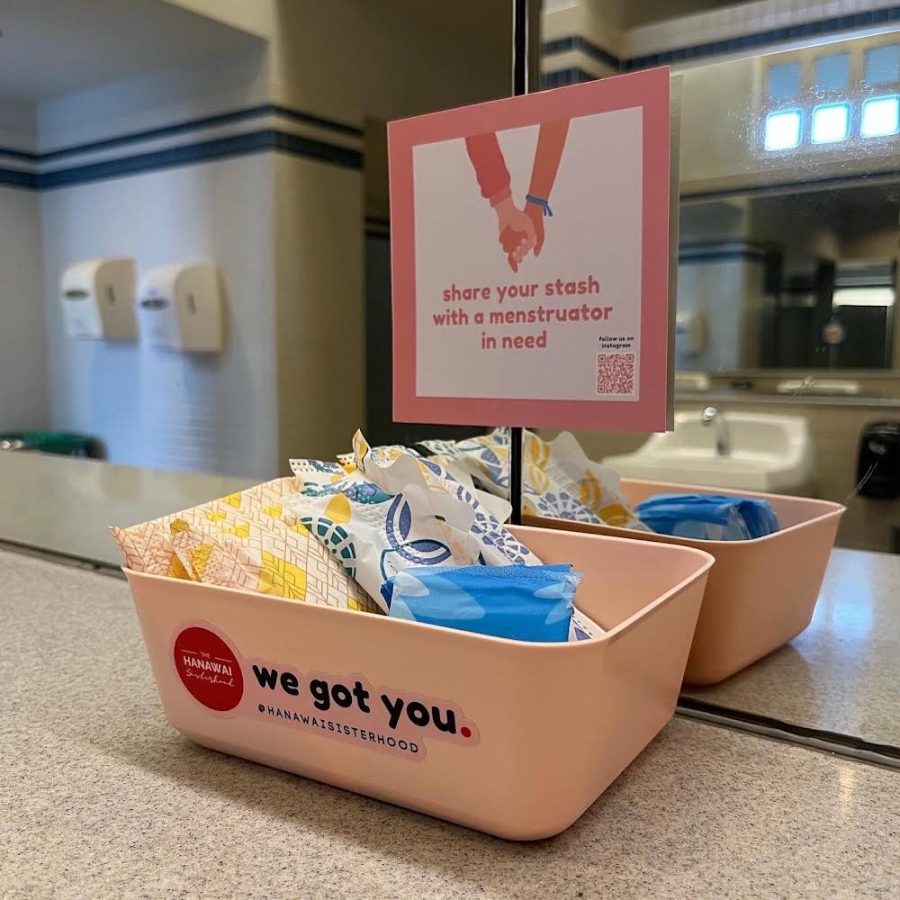Period poverty– defined as inadequate access to menstrual hygiene products and education– is a public health crisis that negatively impacts the lives of menstruators. In an effort to combat the issue’s presence in the local community, student changemakers are introducing new initiatives to promote menstrual equity.
Since November of 2021, Punahou School students have had access to complementary menstrual hygiene products in various Academy bathrooms. The student-led initiative was started by the Hanawai Sisterhood, a group focused on alleviating period poverty in Hawaii. Founded by Punahou School ninth-grader Austen Kinney, the Hanawai Sisterhood has close ties to the school’s community.
The project took the form of a few small bins placed in multiple bathrooms on campus. The bins are fully stocked with menstrual pads and tampons, each container with a sticker on it concisely stating, “We got you.” Kinney says, “I placed the mini period pantries in Academy restrooms because I hoped they could start a discussion about period poverty. I wanted students, administrators, and decision-makers to understand how lack of access affects students and realize period products are a necessity. I am a freshman now, but I hope that by the time I graduate, we can find free period products in all school restrooms across the state.”
The menstrual equity project has been met with great support from Punahou School’s administration and students. One Punahou high school student Ella Suozzi-Auberry ’22 expresses her approval of the project, “I think it’s necessary. At school, students should focus on their education instead of stressing over getting necessary health supplies.”
Above one bin in the Griffiths Hall girls’ bathroom is a paper that reads, “Toilet paper is free, why not tampons?” The question introduces a key discussion at the core of the period poverty crisis: the high cost of period products. According to a survey by The Hawaii State Commission on the Status of Women, 90.3% of participants believe period products are too expensive. As of 2021, Hawaii remains one of the 30 states in America to tax period products. This is known as a “luxury tax” or a “pink tax” as period products are considered a luxury, not a necessity. Due to the high costs and additional tax, 23.8% of participants have made sacrifices to afford period products.
The effects of period poverty on menstruators include missed school and work, physical health risks, and low self-esteem. A report by the United Nations Educational, Scientific and Cultural Organization concluded that 1 out of every 10 menstruating youth misses school during their menstrual cycle due to period poverty.
Many efforts in recent years have focused on promoting menstrual equity. Various organizations have been formed to combat period poverty including Days for Girls, Global Girls Leading Our World (G.L.O.W.), PERIOD., and more. The organizations work to educate people on period poverty and provide menstrual health products to menstruators.
When asked about the future of the menstrual equity initiative at Punahou School, Suozzi-Auberry states, “I think the project is simply a starting point for future initiatives. Hopefully, Punahou’s administration will consider funding a more long-term project of their own.”
How can you help? The Children’s Hospital of Philadelphia PolicyLab proposes five ways to show your support: normalize discussions about menstrual health, talk to menstruators about how they purchase menstrual products, continue to research period poverty, promote menstrual equity in the medical community, and serve as an advocate for key issues.

